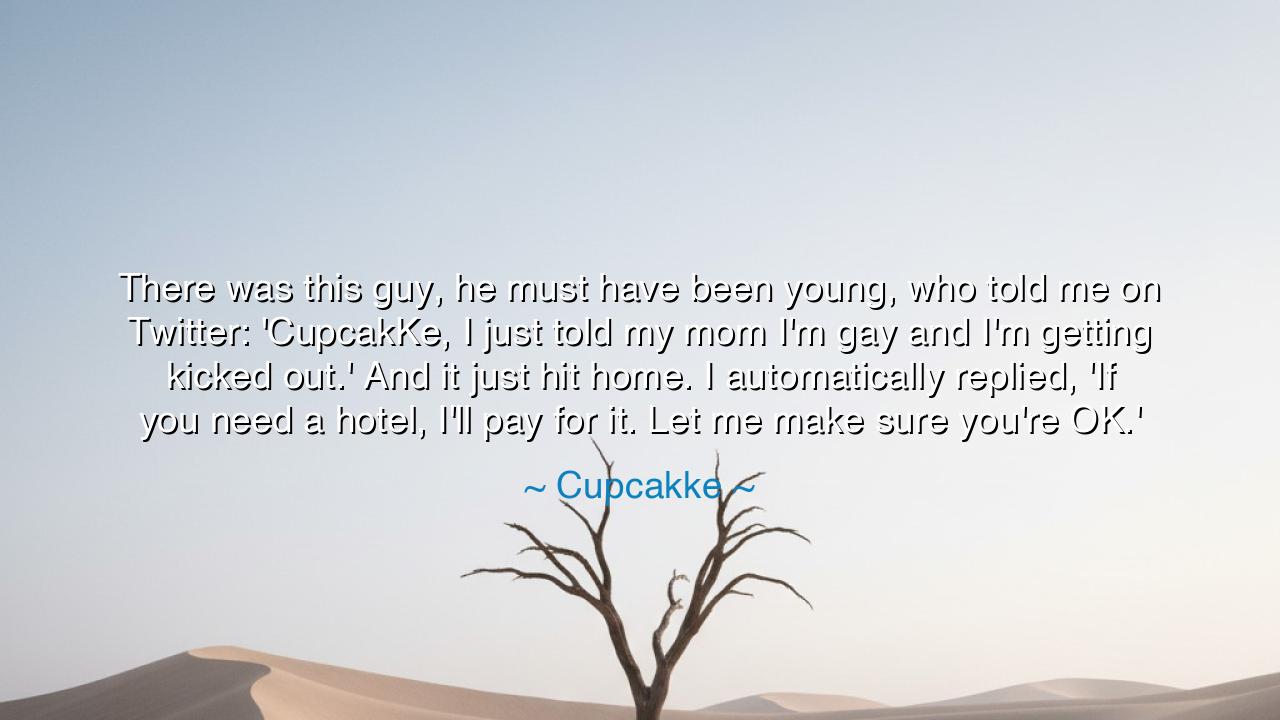
There was this guy, he must have been young, who told me on
There was this guy, he must have been young, who told me on Twitter: 'CupcakKe, I just told my mom I'm gay and I'm getting kicked out.' And it just hit home. I automatically replied, 'If you need a hotel, I'll pay for it. Let me make sure you're OK.'






Hear the compassionate words of CupcakKe, whose heart spoke not in song alone but in action: “There was this guy, he must have been young, who told me on Twitter: ‘CupcakKe, I just told my mom I’m gay and I’m getting kicked out.’ And it just hit home. I automatically replied, ‘If you need a hotel, I’ll pay for it. Let me make sure you’re OK.’” In these words shines the eternal truth that kindness is the highest art, and that the greatness of a person is not measured by their fame, but by their willingness to lift another when the world has cast them down.
The heart of this saying rests in the reality of rejection and compassion. The young man faced the crushing pain of being cast out by his own family, a place where love should dwell most securely. Yet when the very bonds of home were severed, a stranger stepped in with the love he had been denied. CupcakKe, though bound to him only by the thin thread of the digital world, answered with an act of shelter and safety. Here we see that family is not always of blood, but of those who choose to care.
The ancients too celebrated such acts of hospitality and protection. Among the Greeks, the sacred law of xenia demanded that one offer food and shelter to a stranger, for the gods themselves might walk the earth disguised as wanderers. In the Scriptures, the parable of the Good Samaritan reveals the same truth: that true neighborliness is not in shared lineage or faith, but in mercy freely given. CupcakKe’s response echoes this ancient tradition, proving that compassion is timeless, whether spoken in sacred texts or through the instant reply of a social message.
History too bears testimony. Think of Harriet Tubman, who risked her life countless times to guide those cast out by slavery to freedom. She too looked upon the suffering of strangers and declared, “Let me make sure you’re OK.” Or recall Raoul Wallenberg, who during the Holocaust issued thousands of protective passports to Jews marked for death. These lives show the same principle: when cruelty casts people into darkness, it is the courage of compassion that brings them back into light.
Yet in this story there is also a reflection of sorrow. That a young man should be kicked out of his home for speaking his truth reveals the cruelty still present in our age. The world has advanced in knowledge, yet hearts still close in fear and judgment. CupcakKe’s words remind us that progress in law and culture means little if love and acceptance are absent in the heart. The sadness of rejection is what makes the beauty of compassion all the more radiant.
The lesson for us is clear: when you hear the cry of another, do not remain silent. If you cannot lift every burden, lift the one before you. If you cannot house the homeless, still offer warmth. If you cannot change the entire world, change the world for one person. For in the eyes of the one you rescue, your kindness is no small thing—it is salvation itself.
Practical wisdom calls to us: be alert to those around you who are struggling, whether in your family, your community, or even strangers who reach you through unexpected paths. Offer what you can—whether shelter, food, money, or simply words of support. And when you see cruelty, do not echo it with silence. Stand in its way, even with the smallest act of mercy. For mercy given is never wasted, and kindness offered never dies.
Thus, the words of CupcakKe endure not as mere anecdote but as eternal teaching: “Let me make sure you’re OK.” May we take this phrase as our own vow, spoken to the vulnerable, the rejected, and the lost. For in every age, the measure of true greatness is not what we build for ourselves, but what we give to others when they need us most. And in this, we become not only artists of music or craft, but artists of humanity itself.






AAdministratorAdministrator
Welcome, honored guests. Please leave a comment, we will respond soon